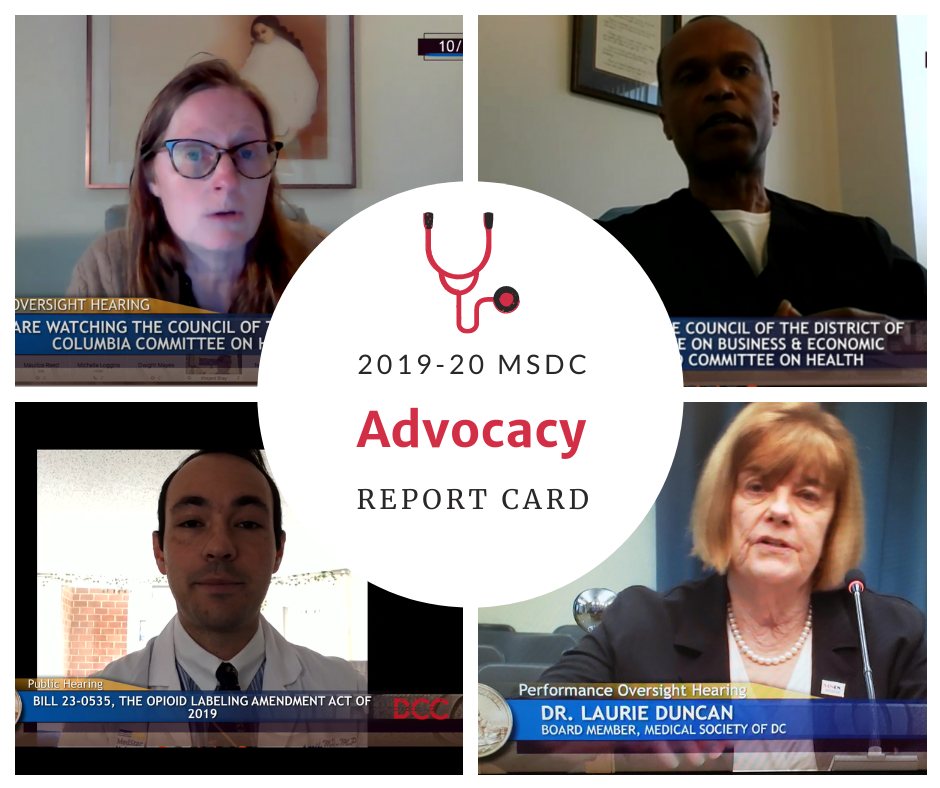Physician Voices for Patient Safety

On this page:
About the bill
Impact on patients in DC
Impact of physicians in DC
What can you do?
Resources
About the bill
In November 2023, DC Health introduced B25-545, the Health Occupations
Revisions General Amendment Act of 2023. This bill was a comprehensive
rewrite of the law overseeing medical licensing and regulation in
Washington, DC. Unfortunately, the bill as written overhauled
scope of practice, place allied health professionals in oversight
positions of medical licensing, and remove the physician from the center
of the care team. After much work and a number of legislative wins, the bill passed the Council on May 7.
MSDC has long advocated that a physician is the most qualified professional at the head of a care team. Physicians have the most health education and pre-practice experience of any health professional, and thus must be involved in all but the most mundane health care decisions. Allied health professionals are a valuable part of the care team, but their medical education and experience limits their role.
The Medical Society of the District of Columbia (MSDC) is the leading voice for physicians in Washington, DC, committed to uniting physicians to advocate for physician-led health care in Washington, DC that protects patients from harm and increases access to quality care. MSDC is leading a coalition of Washington, DC specialty medical societies to advocate against the Health Occupations Revisions General Amendment Act of 2023.
Impact on DC medicine
Below is a breakdown of some of the major changes the bill contains; click on the title to expand how the bill would change that item.
Currently the Board of Medicine is composed of 10 physicians and 4 members of the public. The bill as amended would reduce the number of physicians to 9 and adds 2 physician assistants but keep
the four members of the public health.
The concern: The bill would codify that APRNs could independently diagnose, prescribe, and administer medicine.
The details: See the analysis from G2L Law Firm on the APRN provisions | See our one-pager on this issue that you can share with colleagues and the Council
The solutions: Independent Advanced Certified Nurse Practitioners should have a defined scope of practice limited to the following functions:
- Practice only in the field of certification;
- Comprehensive physical assessment of patients;
- Certify to the clerk of the court that an adult has given birth;
- Certify to the Transportation authority that an individual has special needs for certain health reasons;
- Complete date of birth and medical information on a birth certificate;
- Complete a death certificate if medical examiner does not take charge and deceased was under the care of the PN;
- Establish medical diagnosis of common short-term and chronic stable health problems;
- File a replacement death certificate;
- Issue a “do not resuscitate order” in medical emergencies;
- Order, perform, and interpret laboratory and diagnostic tests;Prescribe drugs and devices under DC controlled substance Schedules II-V with a valid DEA license, and medical marijuana under DC laws;
- Provide emergency care within the scope of their skills;
- Refer patients to appropriate licensed physicians or other health care providers;
- Certify to utility company that a client has a serious illness or the need for life-support equipment;
- Witness an advanced directive;
- Sign off on home health/care orders.
The concern: As seen below, additional allied health professions are permitted to apply anesthesia. Most concerning is the scope expansion that could permit nurse anesthetists to practice without physician collaboration.
The details: See our one-pager on this issue that you can share with colleagues and the Council
The solution: This bill asks to repeal Section 603 of DC official code ₰3-1206.03, and this action will allow nurse anesthetists to administer anesthesia without an anesthesiologist or other physician's direct collaboration. Language seeking repeal of Section 603 of DC official code ₰3-1206.03 should not be included.
This bill adds Sec. 605a, which contains language that a CRNA may plan and deliver anesthesia, pain management, and related care to patients or clients of all health complexities across the lifespan. Language adding Sec. 605a should be removed from this bill.
The expands audiologists' scope to include "cerumen management" and "interoperative neurophysiologic monitoring" and permits audiologists to screen for cognitive, depression and vision.
The bill completely rewrites the definition of the practice of "chiropractic". Chiropractors could:
- Diagnose and treat biomechanical or physiological conditions that compromise neural integrity or organ system function
- Refer patients for further medical treatment or diagnostic testing
The details: See our one-pager on this issue that you can share with colleagues and the Council
The bill would expand pharmacists' scope to include:
- Ordering labs
- Scheduling and monitoring drug therapy
- Ordering, interpreting, and performing more tests
The details: See our one-pager on this issue that you can share with colleagues and the Council
The bill would permit physical therapists to independently evaluate and treat disability, injury, or disease. PTs may also order imaging as part of their treatment plan.
The concern: The bill expands podiatrists scope of practice to allow:
- apply anesthesia as part of treatment; and
- administer vaccines and injections.
The details: See our one-pager on this issue that you can share with colleagues and the Council
Throughout the bill, restrictions on nursing scope of practice are removed or loosened throughout. Specific language outlining what and how nurses can practice is removed and replaced with more vague language giving the Mayor (read DC Health)
the ability to dictate scope. This applies to many different nursing types, like APRNs and NPs.
Articles on scope of practice
MSDC Announces 23rd Council Period Report Card

As MSDC prepares for 2021 and a new Council period, the Society is pleased to share a "report card" on its advocacy activities for the 23rd District Council period (2019-2020).
The two-year period that just ended saw a surge of physician advocacy on important medical issues. COVID-related advocacy dominated the second half of the session, but numerous issues saw physicians testifying and MSDC staff working with lawmakers to protect practices and patients. The past Council session also saw MSDC's new issue priority ranking, policy agenda, and advocacy website.
In addition to encouraging physicians to testify directly to lawmakers, MSDC partnered with other healthcare associations and entities to pass legislation to make the District the best place to practice medicine.
You can see a brief summary of the advocacy report card here and the full report card here, but some areas of success of the physician community include:
- Permitting reimbursement for audio-only telemedicine
- Allowing for patients to receive FDA approved biosimilar drugs
- Prohibiting retribution from employers for physicians practicing reproductive health medicine
- Expanding insurance coverage requirements for newborns, parents, and pregnant women
- Limiting out-of-pocket costs of insulin for patients
- Defeating three different content-specific CME requirements
In addition to working on issue-specific legislation, MSDC members and leaders testified on the following issues:
- Protecting independent practices in underserved medical areas
- Providing support for independent physician practices during COVID-19
- Promoting physician wellbeing and addiction programs, and not unduly punishing physicians suffering from burnout or addiction
In 2021, MSDC will unveil an expanded, engaging advocacy program that will assist physicians in advocating on issues important to them, as well as equipping them to speak out on these issues. Keep an eye on our website for more information.

Leave a comment